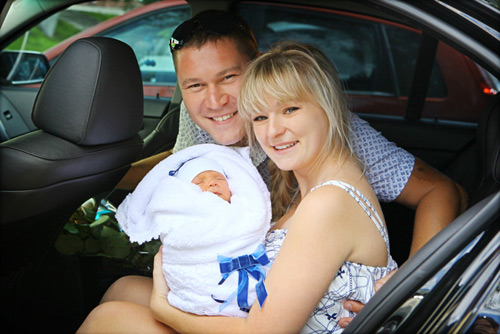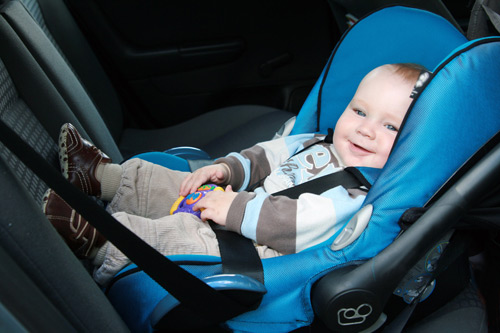Choosing The Family Vehicle

A New Addition to Your Family?
Congratulations! Whether you're already a parent or you're welcoming your first baby, your growing family means changing needs when it comes to your vehicle.
How Will Your Car Use Change?
Taking some time to consider this question will help you to choose wisely from what can be a confusing array of vehicle choices.
First of all, consider that your baby will be a special new passenger with important places to go! You may be shopping more often. There will be trips to your doctor's office for those all-important well-baby visits. You may be making special trips - both local and long distance - to introduce baby to your friends and family. If you are working, your baby may also have a commute of her own to daytime care.
Add up the miles that you expect to drive to reach all these places in addition to your normal driving destinations. Knowing how many miles you will be driving, and whether those will be local or highway miles, will be important in determining how much you might pay for fuel and insurance, and how often your vehicle will require regular maintenance.
Who Will be Driving?
You will want to be sure to consider the comfort and safety of all the potential drivers. Think about the vehicle that you've been driving, and others that you have driven. What did you like and dislike about driving them? Did they have enough seat adjustment? Were important controls easy to reach and use? Did you have good visibility all around the vehicle, including the mirrors? Make a list of all your likes, dislikes, and "gotta haves!" to take with you when you go to talk to your new car dealer.
You will probably give a lot of thought to providing a bright and comfortable nursery for your baby. You also need to consider where your growing family's vehicle will be spending the night. If you will be parking in a garage, write down measurements to be sure that your chosen vehicle won't be too tall to fit through the door or too long to fit in the garage, and that there is sufficient room in the garage to open the doors and enter and exit the vehicle safely. If you will be parking outdoors or on the street, be aware of your local ordinances that may limit the kinds of vehicles that are parked overnight.

Car Seats
Your baby's car seat will be one of your most important purchases. Car seat technology has changed and improved rapidly, so you should seriously consider buying a new seat for your new baby even if you have older seats available. Consider donating gently used older seats.
For newborns and small infants, the familiar "bucket" style seat is a convenient choice. These seats can easily move from the stroller to a car-mounted bracket without unbuckling Baby. When these seats are mounted in the vehicle, your baby will face rearward, which is the safest position for the smallest infants. These seats, like all infant and child seats, should NEVER be mounted in the front seat of a vehicle. They should always be installed securely in a back seat.
Older children will eventually move to a larger forward facing seat which lets them enjoy the view safely! The child's size, weight and age will determine when it's the right time to graduate to a larger seat.
Many states now require older children to ride in safety seats as well. New seat types have evolved to meet this need. Again, size and weight are the main factors in selecting the right product, but regardless of type all safety seats are only truly effective if they are properly installed in your vehicle.
How Can You Tell if Your Seat is Mounted Safely?
The best way is to visit your local police department. They will inspect your seat for proper installation, and they may also be able to point out features of your vehicle which can make safe installation easy every time. Many vehicles are now equipped with buckles or other hardware especially for mounting child seats.
Remember that you will need to lift Baby and car seat in and out of the vehicle. Will you have problems moving your child into a taller vehicle, like an SUV? Will you be able to move Baby easily into a back seat with a tight rear door opening? It's best to bring along your seat to try it out when you look at a new vehicle. Your new car consultant will be happy to assist you in making a choice that works best for you.
Your New Friend:
A trusted auto repair technician
One of the most important steps you can take toward happy vehicle ownership is to establish a relationship with a trusted auto repair technician. In addition to being your "go-to" person when problems occur, your technician can head off potential problems by providing regularly scheduled services like oil changes and by advising you when less frequent services like new tires are needed.
To find a good local technician, start by asking your friends who they use and trust. Word gets around about quality service! If you are new to an area, you might want to check out potential candidates through the local Better Business Bureau, or ask the local chamber of commerce whether the shop is a member. Good technicians are good businesspeople who are interested in their communities.
Before you have an emergency need, visit your candidate technician for a routine service visit on your current vehicle. If the technician recommends additional services, don't hesitate to ask for explanations - it's your vehicle and your money! A trustworthy shop will always ask for your approval in advance if additional work is necessary.
After you have established a satisfactory relationship with your technician, ask for advice when you are considering the purchase of a new vehicle. A good shop will have experience with hundreds of vehicles of all kinds, and will gladly share their recommendations and observations about reliability and service costs.
Everybody Needs Insurance
Car insurance is an indispensable part of vehicle ownership. Insurance protects you in many ways, even if you are never at fault in an accident. Proper insurance can cover repair of your vehicle in case of an accident, financial liability you may incur if you are at fault, and legal representation when it is needed in case of an accident.
An insurance agent can help you to determine what kind and level of coverage are right for you. If you have a car loan, your lender may require certain levels of coverage, and your insurance agent can help with this. Be sure to consider the effect of deductibles on your insurance cost. The deductible is the portion of the loss for which you must pay in the event of a claim. Low deductibles may seem attractive because they lower your out-of pocket expense at claim time, but low deductibles result in higher insurance rates. It may make more sense for you to save money on premiums by accepting a higher deductible.
Many car insurance companies also offer other kinds of insurance like homeowner coverage, and will offer discounts for customers holding multiple policies. When it's time for new car coverage, consider a complete review of your insurance needs. This big picture view could save you money!
 PREGNANCY
PREGNANCY  GIVING BIRTH
GIVING BIRTH  BABY CARE
BABY CARE  HEALTH & SAFETY
HEALTH & SAFETY  FUN STUFF
FUN STUFF  FAMILY
FAMILY 